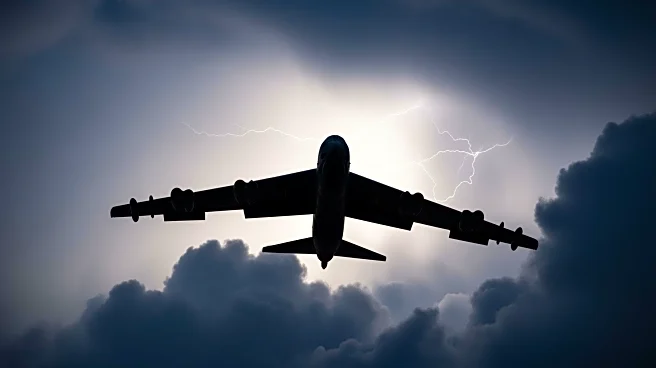What's Happening?
The United States has deployed three B-52 bomber jets near the coast of Venezuela, as confirmed by a Global Strike Command spokesperson. This military maneuver is part of a broader strategy to demonstrate
U.S. military capabilities in the region. The deployment comes amid heightened tensions between the U.S. and Venezuela, with the latter often criticizing U.S. policies and actions in Latin America. The B-52 bombers, known for their long-range capabilities, are typically used for strategic bombing missions and can carry both conventional and nuclear weapons. This move is seen as a show of force, potentially aimed at deterring any aggressive actions from Venezuela or its allies.
Why It's Important?
The deployment of B-52 bombers near Venezuela is significant as it underscores the U.S.'s commitment to maintaining a strong military presence in the region. This action may influence geopolitical dynamics, particularly in Latin America, where U.S.-Venezuela relations have been strained. The presence of these bombers could serve as a deterrent to Venezuela, which has been critical of U.S. influence in the region. Additionally, this move may reassure U.S. allies in Latin America of America's support and readiness to protect their interests. However, it could also escalate tensions, leading to potential diplomatic confrontations or military posturing from Venezuela and its allies.
What's Next?
The deployment of B-52 bombers may prompt a response from Venezuela, potentially in the form of increased military readiness or diplomatic protests. The U.S. may continue to monitor the situation closely, adjusting its military strategy as necessary. Regional allies might also engage in discussions with the U.S. to ensure their security and address any concerns about escalating tensions. Furthermore, international observers will likely keep a close watch on developments, assessing the impact on regional stability and U.S.-Venezuela relations.
Beyond the Headlines
This military maneuver could have broader implications for U.S. foreign policy in Latin America. It may influence how other countries in the region perceive U.S. military actions and their own security strategies. Additionally, the deployment could affect U.S. domestic politics, as military actions often become points of debate regarding foreign policy and defense spending. The ethical considerations of using military force as a deterrent may also be discussed, particularly in the context of international law and sovereignty.









